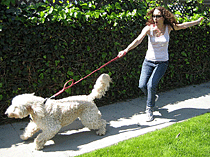All that screeching of "Come here".... "stop doing that ".... "what are you eating"......"stop pulling" ....."stop barking" - and- the phrase that sets my teeth on edge "be nice" are habits that shows that an owner has no control whatsoever on their animal. They misbehave because in their mind you are a push over and he/she is top dog in your relationship.
You get to be top dog by acting exactly as a dog does, challenging your dog and making sure that you win. You know those moments when they won't come back when you call; races off to join a group or chase birds and you are screaming at the top of your voice to get them back. Your methods of challenging them is a bit different though. Where as two dogs will challenge each other by stiff-legged standoffs or fighting, you use a series of very effective situations that are set up so that you know for sure that you will win. I know, I know, you are stacking the decks against your dog. By making sure that you will win, because you won't accept anything else less than your dog's complete acceptance that you are boss. Your job is to progress through an entire series of challenges and win every one of them. The process is called obedience training. It teaches your dog that in every situation they must do what you say, even though they may not have done things that way if left to his/her own choices.
What happens when a dog fully accepts you as top dog? A huge burden is removed from their mind. They have trusted you in all sorts of ways, and in each one you made sure that they did what you said, whether they agreed with you or not. They know that you are trustworthy, smarter and stronger and will make good decisions. they will then relax and simply do what you tell them or what you allow. They don't have to be constantly vigilant for danger outside the pack; you, as pack leader will do that. All they has to do is obey your commands. It is reassuring to them and makes them a calmer animal.
Trivia................................
By the way,
Happy Valencakes Day
For the first time in 73 years, Pancake Day and Valentine's Day happen to fall consecutively on the 13th and 14th February. I think this calls for a big cakey love blowout, along with a brand new holiday - Valencakes Day.
......and the times they are a-changing. Only 42 days to putting your clocks forward. Sunday March 25 is the day to fiddle with all the clocks and watches in your house so if you want to be on time for work/gardening/sitting around in your pyjamas watching re-runs of Midsomer Murder, then you might want to consider changing them. Just thought I would remind you! Oh! You're more than welcome!
Now here's a well trained dog who brings home the cat after a night out on the tiles!
Dawn ("") xx
